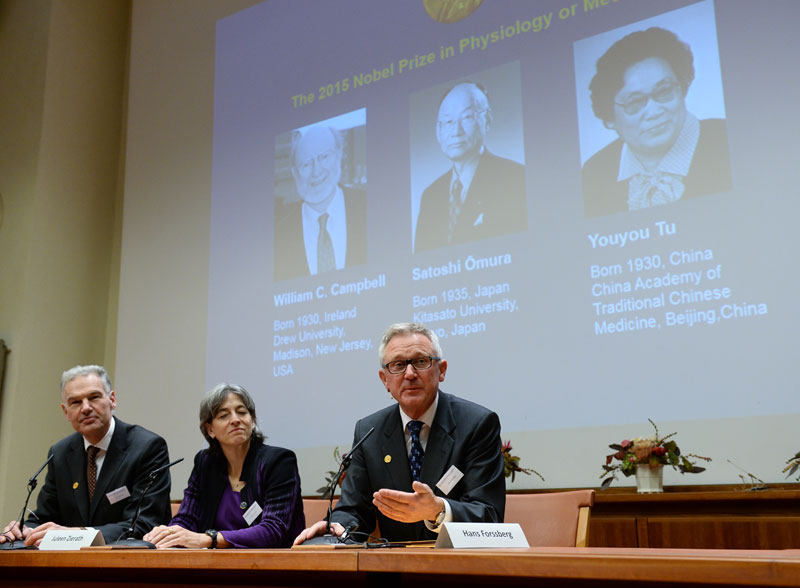3 share Nobel medicine prize for new tools to kill parasites
STOCKHOLM: Three scientists from the US, Japan and China won the Nobel Prize in medicine on Monday for discovering drugs to fight malaria and other tropical diseases that affect hundreds of millions of people every year.
The Nobel judges in Stockholm awarded the prestigious prize to William Campbell, who was born in Ireland and became a US citizen in 1962, Satoshi Omura of Japan and Tu Youyou — the first-ever Chinese medicine laureate.
Campbell and Omura were cited for discovering avermectin, derivatives of which have helped lower the incidence of river blindness and lymphatic filariasis, two diseases caused by parasitic worms that affect millions of people in Africa and Asia.
Tu discovered artemisinin, a drug that has helped significantly reduce the mortality rates of malaria patients.
"The two discoveries have provided humankind with powerful new means to combat these debilitating diseases that affect hundreds of millions of people annually," the committee said. "The consequences in terms of improved human health and reduced suffering are immensurable."
River blindness is an eye and skin disease that ultimately leads to blindness. About 90 percent of the disease occurs in Africa, according to the World Health Organization.
Lymphatic filariasis can lead to swelling of the limbs and genitals, called elephantiasis, and it's primarily a threat in Africa and Asia. The WHO says 120 million people are infected with the disease, without about 40 million disfigured and incapacitated.
Campbell, 85, is a research fellow emeritus at Drew University in Madison, New Jersey. Omura, 80, is a professor emeritus at Kitasato University in Japan and is from the central prefecture of Yamanashi. Tu, 84, is chief professor at the China Academy of Traditional Chinese Medicine.
Campbell, a retired scientist who spent 33 years at pharmaceutical company Merck and now lives in North Andover, Massachusetts, said the award came as a huge surprise.
"It was a great team effort by the people at Merck and Company," Campbell said.
Omura wondered whether he deserved the prize.
"I have learned so much from microorganisms and I have depended on them, so I would much rather give the prize to microorganisms," Omura told Japanese broadcaster NHK.
Omura isolated new strains of Streptomyces bacteria and cultured them so that they could be analyzed for their impact against harmful microorganisms, the Nobel committee said.
Campbell showed that one of those cultures was "remarkably efficient" against parasites in animals. The bioactive agent was purified and modified to a compound that effectively killed parasitic larvae, leading to the discovery of new class of drugs.
Tu turned to herbal medicine to discover a new anti-malarial agent, artemisinin (pronounced ar-tuh-MIHS'-ihn-ihn), that was highly effective against malaria, a disease that was on the rise in the 1960s, the committee said.
Malaria is a mosquito-borne disease that still kills around 500,000 people a year, mostly in Africa, despite efforts to control it.
Colin Sutherland, reader in parasitology at London School of Hygiene and Tropical Medicine, said that the impact of artemesinin had been profound. It's so widely used across the world that there's a risk of resistance problems.
"The writing is on the wall already. We probably have about five to 10 years of effective use of artemesinins before resistance becomes a problem," he said.
The WHO says artemisinin resistance has already been confirmed in Cambodia, Laos, Myanmar, Thailand and Vietnam.
The last time a Chinese citizen won a Nobel was in 2012, when Mo Yan got the literature award. But China has been yearning for a Nobel Prize in science. This was the first Nobel Prize given to a Chinese scientist for work carried out within China.
"This is indeed a glorious moment," said Li Chenjian, a vice provost at prestigious Peking University. "This also is an acknowledgement to the traditional Chinese medicine, for the work began with herbal medicine."
The medicine award was the first Nobel Prize to be announced. The winners of the physics, chemistry and peace prizes are set to be announced later this week. The economics prize will be announced next Monday. No date has been set yet for the literature prize, but it is expected to be announced on Thursday.
The winners will share the 8 million Swedish kronor (about $960,000) prize money with one half going to Campbell and Omura, and the other to Tu. Each winner will also get a diploma and a gold medal at the annual award ceremony on Dec. 10, the anniversary of the death of prize founder Alfred Nobel.
Last year's medicine award went to three scientists who discovered the brain's inner navigation system.






